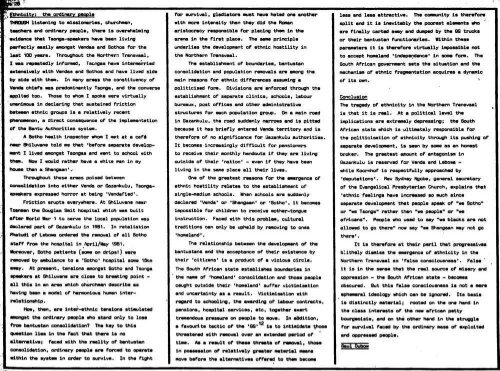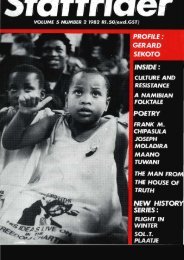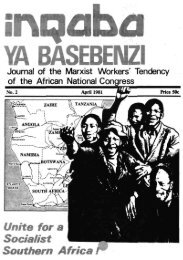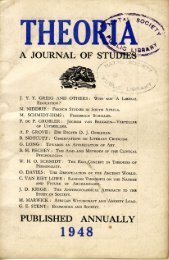You also want an ePaper? Increase the reach of your titles
YUMPU automatically turns print PDFs into web optimized ePapers that Google loves.
gar.<br />
rgthnicjty: the ordinary people<br />
THROUGH listening to missionaries, church—n,<br />
teachers and ordinary people, there la overahelalng<br />
evidence that Teonga-epeakers hava baan living<br />
perfectly easily amongst Vandaa and Sothoa for tha<br />
last 100 years. Throughout tha Northern Tranevaal,<br />
X aaa repeatedly Informed, Tscopes have intaraerrled<br />
extensively eith Vandaa and Sothoa and hava lived alda<br />
by alda with tnaa. In aany araaa tha conatltuency of<br />
Vanda chlafa aaa predominantly Taonga, and tha convarsa<br />
appllad too* Those to whom I spoke wvn virtually<br />
unanimous in declaring that sustained friction<br />
bataean athnlc groupa la a ralatlvaly racant<br />
phanoaanon, a dlract consequence of tha implementation<br />
of tha Bantu Authorities system.<br />
A Sotho haalth inspector ehoa I met at a cafe<br />
naar »lluuane told aa that *bafora aaparata develop-<br />
aent I llvad amongst Taongas and sent to achool aith<br />
thaw. Horn I would rathar hava a ahite men In ay<br />
houaa than a Shangean'.-<br />
Throughout these araas poised between<br />
coneoUdetion into althar Vanda or Gezankulu, Taonga-<br />
apaaKara expressed horror at balng 'Vendafied'.<br />
Friction arupts everywhere. At Ghlluvana naar<br />
Txanaan tha Oouglaa Salt hoapltal ahlch eas built<br />
after World War 1 to aarva tha local population aa*<br />
declared pert of Gazankulu In 1961. In retaliation<br />
Phatudl of Laboaa ordered tha removal of all Sotho<br />
ataff froa tha hospital in Aprll/aay 1981,<br />
Moreover, Sotho patlanta (soma on drips i] vara<br />
reached by ambulance to a 'Sotho 1 hoapltal some 15cm<br />
•way. At preaent, tanalona ajaongat Sotho and Taonga<br />
epeakara at Shiluvane ara close to breaking point -<br />
all this in en araa ahlch churchman daacrlba aa<br />
having baan a modal of haraxmloua huaan inter-<br />
ralationehlp.<br />
How, than, ara inter-ethnic tanalona stimulated<br />
aaongat tha ordinary paopla aho atand only to lota<br />
froa bantuatan consolidation? Tha key to thla<br />
quaation llaa in the fact ttiet there ia no<br />
altarnatlva; facad with tha raallty of bantuatan<br />
consolidation, ordinary paopla ara foread to oparata<br />
within tha ayataa In ardor to survive. In tha fight<br />
for survival, gladiators auat hava hotad ona another<br />
with more intanaity than thay did tha Roman<br />
aristocracy responsible for placing than in tha<br />
arana in tha firat placa. Tha aaaa prlnclpla<br />
undarllaa tha davalopaant of athnic hostility in<br />
tha Northam Transvaal.<br />
Tha aatabllahmant of boundariaai bantuatan<br />
consolidation and population raaovala ara aaong tha<br />
aaln masons for athnic dlffarancaa asaualng a<br />
politicised fora. Oiviaiona ara anforcad through tha<br />
aatabllahaant of aaparata cllnice, schools, labour<br />
bureaux, poat offlcaa and othar adalnlatratlva<br />
atructuraa for aacn population group. On a aaln road<br />
In Gazankulu, tha road suddenly narroaa and la pittad<br />
because It haa brlafly antarad Vanda territory and la<br />
tharafora of no algnlficanca for 5ezankulu euthoritiee.<br />
It becomes Incraaaingly difficult for pensioners<br />
to racalva their aonthly handouta if thay ara living<br />
outside of thalr 'nation' * even If they have baan<br />
living in the same placa all thalr Uvea.<br />
One of tha greatest reasons for tha eaargence of<br />
athnlc hostility relates to tha establlahaant of<br />
slngle^nediua schools. Whan schools ara auddanly<br />
daclarad 'Vanda' or 'Qhangaan' or 'Sotho 1 . It bacoaaa<br />
Impossible for children to receive aother*tongue<br />
Instruction. Faced «ith this problem, cultural<br />
traditions can only be upheld by removing to onee<br />
'homeland*.<br />
Tne relationship bataean the davalopaant of tha<br />
bantustans and tha acceptance of their existence by<br />
thalr 'citizens* is a product of a vicious circle.<br />
The South African state establishes boundaries in<br />
the name of 'homeland 1 consolidation and those people<br />
caught outalda their 'hoaeland' euffer victimisation<br />
and uncertelnty as a result, victimisation with<br />
regard to schooling, tha awarding of labour contracts,<br />
pensions, hospital aervlces» etc, together exert<br />
treaendoue pressure on people to eove* In addition,<br />
a favourite tactic of tha 'GO' 12 ia to intlaldata tno*o<br />
threatened eith removal over an amended period of<br />
tlaa. As a raeult of these threats of removal, those<br />
in poaaaaelon of relatively greater aatarial nmmn*<br />
move before the eltamatlvee offered to thaa become<br />
laaa and leaa attractive. The community la therefore<br />
split and It is inevitably tha pooreet alaaenta aho<br />
are finally carted easy and duapad by the M trucks<br />
or their bantuatan functionaries. Within these<br />
peraaetere it la therafore virtually lapoaaible not<br />
to accept homeland 'independence• in aoaa form. Tha<br />
South African govarnaant seta the situation and the<br />
nechenlea of ethnic fragaantat1on acquires a dynamic<br />
of its own. *<br />
Conclusion<br />
Tha tragedy of ethnicity in the Northam Transvaal<br />
le that it la real. At a political level tha<br />
lapllcetlona ara extremely depressing; tha South<br />
African atate ahlch ia ultleately responsible for<br />
the polltlcleetlon of ethnicity through its pushing of<br />
separate davalopaant. ia seen by soaa aa an honeet<br />
broker. The greatest amount of antagonism in<br />
Gaxankulu ia reserved for Vends end Laboaa -<br />
ehile Koornhof la respectfully approached by<br />
'deputations 1 . Rev Sydney Ngobet general secretary<br />
of the Evangelical Presbyterian Church , e*plolne that<br />
'ethnic feelings have increased ao much since<br />
separate davalopaant that people apeak of "aa Sotho"<br />
or "ae Taonga" rethar than "we people" or "aa<br />
afrlcane". People aho uaad to aay "aa blacks are not<br />
allowed to go there" no* aay "aa Shangaen aay not go<br />
there'.<br />
It ia tharafora at their peril that progressives<br />
blithely dismiss tha eaargence of ethnicity In the<br />
Northern Transvaal es 'false consciousness'* Falae<br />
it is in tha sense that the real source of edeery and<br />
Oppression - the South African state - becomes<br />
obscured. But this falae conecloueness le not e aare<br />
ephemeral ideology ahlch can be ignored. Its basis<br />
le dletlnctly aatarial; rooted on the one hand In<br />
tha claas interests of tha new afrlcan petty<br />
bourgeoisie, and on the othar hand in the atruggle<br />
for survival faced by the ordinary aaae of exploited<br />
end ccpressed paopla.<br />
Saul Ouboa

















